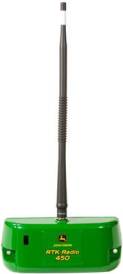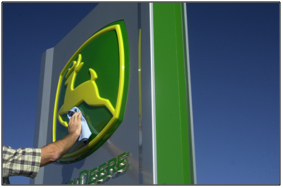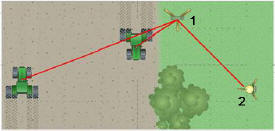John Deere Radio RTK 450

| Make | John Deere |
| Model | Radio RTK 450 |
| Type | Receivers |
Your Preferred Location
Description
- Provides +/- 1 inch pass-to-pass accuracy season after season, and year after year
- Use a Dealer-owned RTK network to reduce your administrative expenses
- Provides less chance of radio interference, and RTK Extend to minimize shading signal loss
- Requires a StarFire 6000 receiver, SF3 Ready Activation, and RTK Ready Activation
- Requires RTK subscription provided by your John Deere dealer or your own base station
Models
Reduce radio interference with John Deere RTK Radio 450


The John Deere RTK Radio 450 requires a license for a dedicated frequency. While a license has to be paid for, the user owns that specific frequency. Unlike the John Deere RTK Radio 900 frequencies, wireless providers or anyone else cannot use that frequency, thus eliminating signal jamming.
The following is a simple way to think about the difference between a John Deere RTK Radio 900 and RTK Radio 450:
- The John Deere RTK Radio 900 uses a frequency band that is like an interstate: it is free and open to the public. If only a few people are using the interstate, it moves fast; however, when everyone uses it at the same time, there is a traffic jam and it moves slowly. Conversely, the John Deere RTK Radio 450 is a private road.
Dealer-owned RTK network benefits producers


More than 200 John Deere dealers across the United States and Canada have set up a large, robust RTK network. This is beneficial for several reasons:
- Producers have a lower investment cost because the dealer purchases and is responsible for base station upkeep.
- Dealer networks cover more area with the RTK signal, giving many producers access to RTK on all of their grounds.
- RTK network is owned, maintained, and supported by a local, certified John Deere dealer.
Contact a local John Deere dealer to inquire about RTK network coverage.
A U.S. Federal Communications Commission (FCC) license is required when utilizing the John Deere RTK Radio 450 on a base station or as a repeater.
Licensing is not required for an RTK machine configuration.
For more details and assistance on obtaining a license, refer to the Dealer Corner section of StellarSupport™ system.
Broaden RTK availability with repeaters


Broaden RTK availability with repeaters
RTK repeaters are radios that can be used to improve base station signal coverage around obstacles, such as trees or rolling terrain. The purpose of the RTK repeater is to receive the correction signal coming from the base station and then transmit that correction signal.
More than one repeater can be used with one base station, but the repeater cannot receive signal from each other in a daisy-chain configuration. In order to operate, a repeater must be connected to a 12-V power source.
A repeater is the same as the radio that is on a machine or base station receiver.
A repeater consists of the following:
- John Deere RTK Radio 450 or 900
- Power harness and bracket
Specifications
- ACTIVATIONS/ SUBSCRIPTIONS REQUIRED : SF3 ready activation, RTK ready activation, and RTK subscription
- ADDITIONAL HARDWARE REQUIRED: RTK Radio
- DELIVERY METHOD : Radio
- HORIZONTAL PASS-TO-PASS ACCURACY : +/- 2.5 cm
- PULL-IN TIME : <1 min
- REPEATABILITY : +/- 2.5 cm long term
Copy Set
Reduce radio interference with John Deere RTK Radio 450


The John Deere RTK Radio 450 requires a license for a dedicated frequency. While a license has to be paid for, the user owns that specific frequency. Unlike the John Deere RTK Radio 900 frequencies, wireless providers or anyone else cannot use that frequency, thus eliminating signal jamming.
The following is a simple way to think about the difference between a John Deere RTK Radio 900 and RTK Radio 450:
- The John Deere RTK Radio 900 uses a frequency band that is like an interstate: it is free and open to the public. If only a few people are using the interstate, it moves fast; however, when everyone uses it at the same time, there is a traffic jam and it moves slowly. Conversely, the John Deere RTK Radio 450 is a private road.
Dealer-owned RTK network benefits producers


More than 200 John Deere dealers across the United States and Canada have set up a large, robust RTK network. This is beneficial for several reasons:
- Producers have a lower investment cost because the dealer purchases and is responsible for base station upkeep.
- Dealer networks cover more area with the RTK signal, giving many producers access to RTK on all of their grounds.
- RTK network is owned, maintained, and supported by a local, certified John Deere dealer.
Contact a local John Deere dealer to inquire about RTK network coverage.
A U.S. Federal Communications Commission (FCC) license is required when utilizing the John Deere RTK Radio 450 on a base station or as a repeater.
Licensing is not required for an RTK machine configuration.
For more details and assistance on obtaining a license, refer to the Dealer Corner section of StellarSupport™ system.
Broaden RTK availability with repeaters


Broaden RTK availability with repeaters
RTK repeaters are radios that can be used to improve base station signal coverage around obstacles, such as trees or rolling terrain. The purpose of the RTK repeater is to receive the correction signal coming from the base station and then transmit that correction signal.
More than one repeater can be used with one base station, but the repeater cannot receive signal from each other in a daisy-chain configuration. In order to operate, a repeater must be connected to a 12-V power source.
A repeater is the same as the radio that is on a machine or base station receiver.
A repeater consists of the following:
- John Deere RTK Radio 450 or 900
- Power harness and bracket

